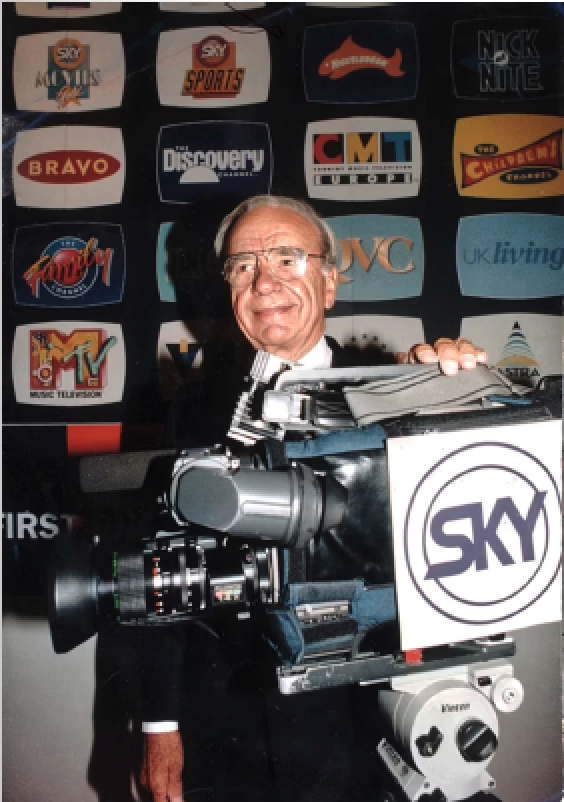Chris Forrester explains how Rupert Murdoch built his early broadcasting empire in the UK which led to the establishment of true multi-channel TV in Europe.
The near-retirement of Keith Rupert Murdoch and appointment as Chairman Emeritus is certainly the beginning of the end for the media mogul. However, European viewers and businesses should grant Mr Murdoch high praise indeed for his launching of Sky Television on February 5, 1989.

Murdoch said last week, “Our companies are in robust health, as am I. We have every reason to be optimistic about the coming years – I certainly am, and plan to be here to participate in them. But the battle for the freedom of speech and, ultimately, the freedom of thought, has never been more intense.”
Sky’s initial 4 channel service used capacity from Astra 1A, a craft designed for telecommunications, but not broadcasting. The channels each occupied a single transponder on the 16 transponder satellite that had been launched in December of 1988.
Murdoch’s gamble was aggressive and carried with it immense financial implications, given the costs of buying and creating content for the four channels. (There should have been five channels, but Disney was slow to sign up and was added later — October 1, 1995). The four channels, Eurosport, Sky News, Sky Movies and Sky One, were expensive beasts. Eurosport, for example, was a joint venture between Sky and the European Broadcasting Union and aimed at a pan-European audience.
All of the channels were initially Free-To-Air (FTA). Sky Movies was encrypted on February 5, 1990, and was available over the European continent, with the pressure to launch driven by the threat of competition from British Satellite Broadcasting (BSB) which had won the rights to use DBS frequencies in HD-MAC (High Definition Multiplexed Analogue Components) for the United Kingdom (UK).
The history of BSB is a case study in catastrophic, governmental intervention. The end result was a true dog’s breakfast of typical compromise, with the BBC holding a 50% share, the various ITV franchises holding 30% and a consortium comprised of Virgin (and subsequently, Bond Corp), Thorn/EMI, Granada TV Rentals, Pearson, Longman and other minority shareholders held the remaining 20%. BSB launched, much later than planned, on March 25, 1990.
_____________________________________
Andrew Neil, Sky’s first chairman,
said this regarding Murdoch’s succession.
“Many years ago, I watched Rupert tease
Lachlan and James about who might end
up succeeding him. They were only
teenagers. But he was of a mind to create
a Murdoch dynasty even then. I ribbed him
about it. He didn’t like the Royal Family
because it was a hereditary dynasty. He
believed, like me, in meritocracy — except
when it came to his own company, in which
he believed in dynasty with all the fervour
of the Windsors. He changed the subject.
Lachlan will know that he would not be
where he now is if he did not have the
Murdoch name. Nor did he build the
company over which he now presides.
That was his father’s work.”
In truth, BSB was bankrupt from Day 1. Its pre-launch costs mushroomed to £354 million by 1989, and a re-set budget talked of costs of £625 million for the first couple of years of operation. BSB initially offered five channels on March 25 to March 29 1990 (plus the Computer Channel that launched on June 28, 1990, and closed in November of 1990).
The battle was on: newcomer Rupert Murdoch versus the established names of BBC and other shareholder luminaries in BSB. Sky Television’s head start had given it some 1.5 million installed dishes by the time BSB launched with a claimed 750,000 subs.
Sky might have been winning subscribers, but the costs were astronomical. BSB was clearly a better technical service, thanks to the MAC images from the powerful Marco Polo 1 and 2 satellites and to smaller ‘squarial’ dishes, and observers commented that it was a re-run of the BetaMax vs VHS tape experience. The better Betamax lost out to the VHS system - and the better BSB system lost out to Sky’s PAL system. BSB and Sky merged into BSkyB on November 2, 1990.
Murdoch had bet the farm and had won... just. The entire experience almost brought down the then Murdoch/News Int’l/News Corp. empire of newspaper and movie interests.
However, and most importantly, Murdoch had broken the domination of UK television by the BBC and heavily regulated ITV franchised holders. Viewers finally had true, multi-channel TV and growth and profits guaranteed. Sky launched in Germany and then Italy followed suit.
On October 12, 2018, Comcast announced they would purchase the rest of Sky that the company did not already own. Comcast paid £17.28 per share, or about £30.5 billion, for Sky’s assets, including the firm’s 23 million subscribers.
Murdoch’s team stated, “We are proud to have played such a significant role in building the incredible value reflected today in Comcast’s offer.”
Author Chris Forrester is the Senior Columnist / Contributor for SatNews Publishers.

